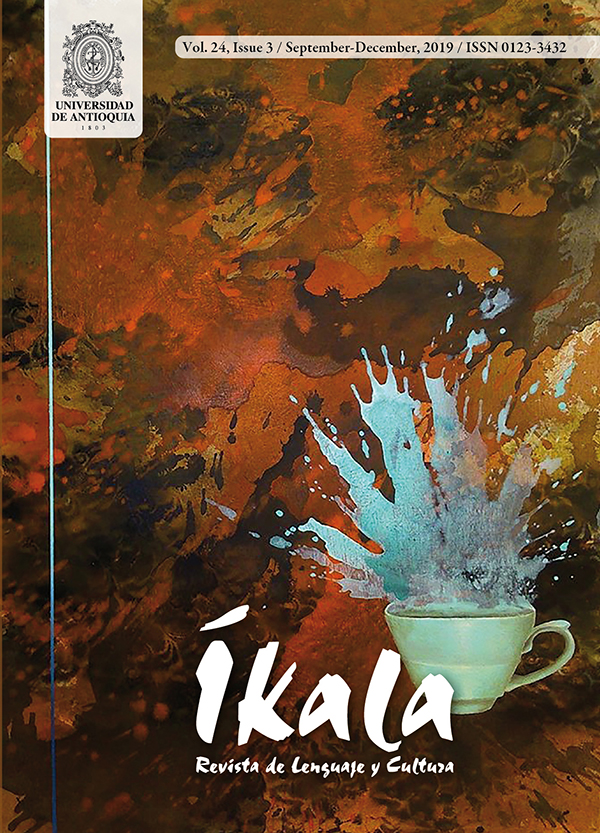Term definitions and its impact on accurate communication for Customs Practices at International level. The case in Colombia.
DOI:
https://doi.org/10.17533/udea.ikala.v24n03a08Schlagworte:
international trade, terminology, customs regulations, trade facilitation, global language, definitionsAbstract
This paper intends to perform a terminological analysis of the definitions set in the Decree 390, 2016 —Colombia’s customs regulations in force. These regulations were enacted by the Colombian government aiming at aligning with international conventions, including those referring to the simplification and harmonization of customs procedures at international trade. This terminological analysis is ground-ed upon theoretical bases for terminology management regarding concepts, terms and definitions. Meanwhile, the theoretical framework provides basic parameters in making definitions, which are used to assess the terms selected. Since customs procedures necessitate an accurate use of language in order to facilitate trade, the definitions appearing in regulatory documents should be developed with care. Thus, this terminological analysis highlights how terminology principles can help improve communications in highly specialized contexts and reduce ambiguity when interpreting regulatory documents. The analysis also aims to establish the extent to which the Colombian government’s efforts to modernize its customs procedures comply with international conventions. As a result of this analysis it is possible to identify some ambiguous definitions in Decree 390 that may lead to misinterpretations with the opposite effect of facilitating trade. It casts light also on the issue of the ever-changing technological advance and how the global language of technology should be also included in this new set of regulations for Colombian international trade practices.
Downloads
Literaturhinweise
Brannen, M. Y., Piekkari, R., and Tietze, S. (2014). The multifaceted role of language in international business: Unpacking the forms, functions and features of a critical challenge to MNC theory and performance. Journal of International Business Studies JIBS, 45(5), 495-507.
International Standardization Organization (ISO). (2000). Terminology work, Vocabulary, Part 1: Theory and application (ISO Standard N.° 1087-1).
International Standardization Organization (ISO). (2011). Terminological entries in standards, Part 1: General requirements and examples of presentation (ISO Standard N. ° 1024-1, p. 57).
International Standardization Organization. (2012). Terminology Work—Principles and Methods: International Organization for Standardization (ISO Standard N.° 704).
Kockaert, H. J., and Steurs, F. (2015). Handbook of terminology. Amsterdam: John Benjamins Publishing Company.
Löckinger, G., Kockaert, H., and Budin, G. (2015). Handbook of terminology. Amsterdam: John Benjamins Publishing Retrieved from https://doi.org/10.1075/hot.1.int1
Ministerio de Hacienda y Crédito Público. República de Colombia. Decreto 2685, 28 de diciembre, 1999.
Ministerio de Hacienda y Crédito Público. República de Colombia. Decreto 390, 7 de marzo, 2016. Retrieved September 7, 2018, from: https://www.mintic.gov.co/portal/604/articles-14747_documento.pdf
Warburton, K. (2015). Managing terminology in commercial environments. In H. J. Kockaert, and F. Steurs (Eds.), Handbook of terminology. Amsterdam: John Benjamins Publishing Company.
World Customs Organization (WCO). (2018). SAFE Framework of Standards to Secure and Facilitate Global Trade. Retrieved from: http://www.wcoomd.org/-/media/wco/public/global/pdf/topics/facilitation/instruments-and-tools/tools/safe-package/safe-framework-of-standards.pdf?la=en
World Customs Organization (WCO). (2008). International Convention on the Simplification and Harmonization of Customs Procedures (as amended). (Revised Kyoto Convention). Retrieved September 7, 2018, from: http://www.wcoomd.org/-/media/wco/public/global/pdf/topics/facilitation/instruments-and-tools/conventions/kyoto-convention/revised-kyoto-convention/body_gen-annex-and-specific-annexes.pdf?la=en
Downloads
Veröffentlicht
Zitationsvorschlag
Lizenz
Copyright (c) 2019 Íkala

Dieses Werk steht unter der Lizenz Creative Commons Namensnennung - Nicht-kommerziell - Weitergabe unter gleichen Bedingungen 4.0 International.












